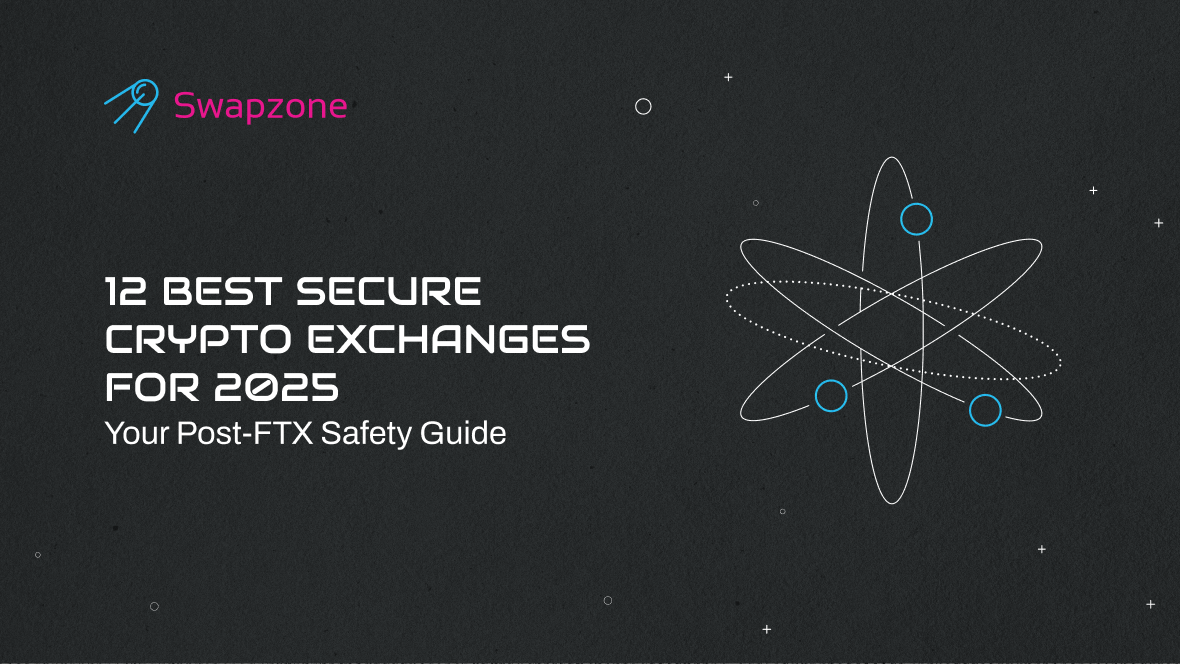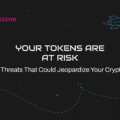The crypto world got a harsh reality check when FTX imploded in November 2022. Overnight, billions of dollars vanished and investors learned a painful lesson: not all crypto exchanges are created equal. If you’re looking for the most secure crypto platforms in 2025, you’re in the right place.
This guide covers the 12 best crypto exchanges for security 2025, focusing on the safety features that matter. Whether you’re reading about secure trading platforms on Reddit or wondering if Robinhood makes the cut for security-conscious traders, we’ll cover everything you need to know about crypto exchange security and crypto trading security 2025.
The stakes are high. With over $3.8 billion lost to crypto exchange hacks and collapses in 2022 alone, choosing a secure platform isn’t just smart – it’s essential for protecting your digital assets. Let’s get into what makes an exchange truly secure and which platforms make the top crypto exchanges for safety in 2025.
Why Crypto Exchange Security Is Important in 2025
FTX Lessons
The FTX collapse wasn’t just another crypto story – it changed how investors evaluate exchange security. Sam Bankman-Fried’s empire crumbled because customer funds weren’t properly segregated, so when Alameda Research made risky trades with user deposits, there was a huge hole. This taught us critical weaknesses we had overlooked.
Before FTX, most traders focused on low fees and trading features, not security fundamentals. The collapse showed that exchanges could look financially sound while secretly mismanaging customer funds. Customer deposits worth over $8 billion just disappeared, teaching us that regulatory compliance and transparent fund custody aren’t optional features – they’re requirements for survival.
The aftermath reshaped the entire industry. Crypto exchange safety features 2025 now include mandatory proof-of-reserves reporting, stricter segregation requirements and more regulatory oversight. Exchanges that survived the FTX fallout did so because they had proper security from day one.

What Security Features Actually Matter.
Real exchange security goes way beyond marketing fluff. Cold storage implementation is the foundation of any secure platform. The best exchanges keep 90-95% of customer funds in offline cold storage, making them unhackable. Hot wallets used for daily operations should be a tiny fraction of total holdings.**Insurance is another layer of protection. Top exchanges have insurance policies for hot wallet breaches and internal theft. But insurance details matter – some only cover the exchange’s own funds, not customer deposits. The most secure platforms have separate insurance for user assets.
Regulatory compliance provides multiple layers of protection. Exchanges operating in strict jurisdictions like the US or EU must meet strict standards for fund segregation, financial reporting and operational transparency. These aren’t bureaucratic red tape – they’re proven protection for customer funds in times of crisis.
Security Standards
Technical Security
Exchange security goes beyond password protection. Multi-signature wallets ensure no one person or system can withdraw without multiple approvals. The most secure exchanges require 3-of-5 or 5-of-7 signature approvals for large transactions, multiple checkpoints to prevent unauthorized access.
2FA has moved beyond SMS codes which can be intercepted through SIM swapping. Leading exchanges now support hardware security keys, biometric authentication and time-based one-time passwords (TOTP) through apps like Google Authenticator. The best platforms make hardware key mandatory for accounts with large balances.
Withdrawal protocols add extra barriers to unauthorized access. Advanced exchanges implement time-delayed withdrawals for new addresses, email confirmation requirements and geographic restrictions based on user behavior. Some platforms even freeze large withdrawals and require manual verification from security teams before processing.
API security protects automated trading systems from compromise. Secure exchanges offer granular permission settings, IP whitelisting and real-time monitoring of API activity. They also provide withdrawal restrictions for API keys so even if keys are compromised, balances can’t be drained.
Financial Safety
FDIC insurance is limited in the crypto space but some exchanges offer partial protection for USD deposits held in partner banks. While this doesn’t protect crypto holdings directly, it protects fiat during deposit and withdrawal. Coinbase offers FDIC insurance for USD balances up to $250,000 per customer.
Segregated customer funds is perhaps the most important financial safeguard. Unlike FTX which commingled customer and corporate funds, secure exchanges keep customer deposits completely separate. This segregation means even if the exchange goes bankrupt, customer funds are untouched and recoverable.
Proof-of-reserves reporting has become standard practice among reputable exchanges since the FTX collapse. These reports verified by independent auditors prove the exchange actually holds the crypto they claim to custody. Kraken and Binance US publish monthly proof-of-reserves so users can verify their holdings themselves.
Emergency fund availability provides extra protection during market stress. The most secure exchanges have substantial emergency funds often called “SAFU funds” that can cover losses from security breaches or technical failures. These funds show the exchange’s commitment to customer protection beyond basic insurance.
Regulatory Compliance Standards.
Geographic licensing requirements are all over the place, some countries have much stronger consumer protections. US based exchanges must comply with FinCEN, state money transmitter licenses and SEC for certain activities. European exchanges operate under MiCA, which provides a comprehensive consumer protection framework.
KYC/AML procedures serve two purposes: regulatory compliance and security. Strong identity verification helps prevent account takeovers and ensures legitimate users have control of their accounts. But too much KYC can be a privacy concern, so the best exchanges balance security needs with user privacy rights.
Government oversight levels create accountability that self regulated exchanges can’t match. Coinbase is a publicly traded company under SEC oversight, Gemini has BitLicense in New York one of the strictest regulatory frameworks in the world. This oversight gives customers legal recourse and operational transparency.
Legal jurisdiction advantages become important in disputes or exchange failures. Exchanges incorporated in countries with strong legal systems and clear cryptocurrency regulations have better customer protections. US and EU based exchanges generally have stronger legal recourse than those in less regulated jurisdictions.
Top 12 Most Secure Crypto Exchanges for 2025
Tier 1: Maximum Security Exchanges
1. Coinbase Pro – The Gold Standard for Security
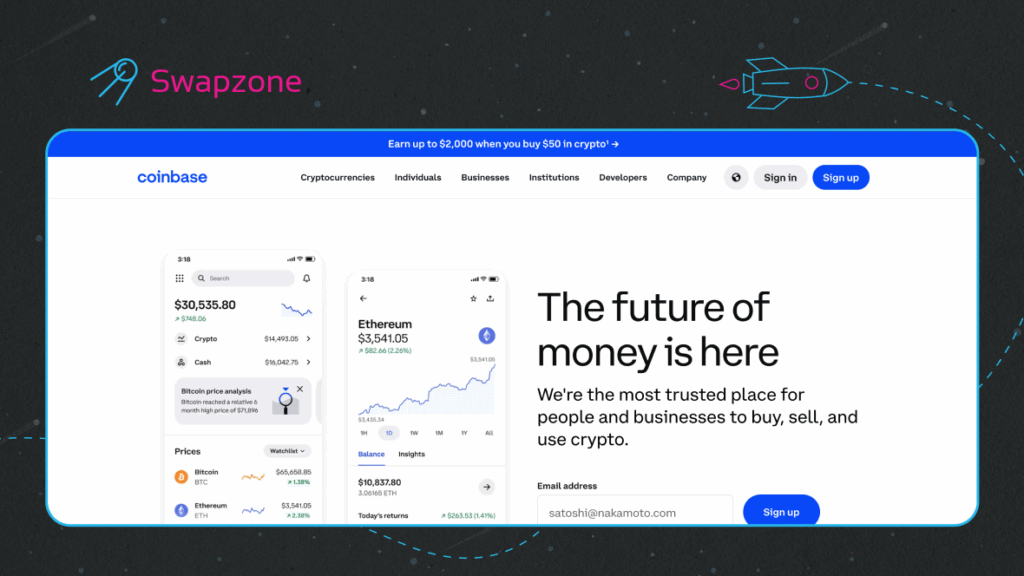
Coinbase is always one of the top 10 crypto exchanges in USA for security and for good reason. As a publicly traded company, Coinbase is under intense regulatory scrutiny which means multiple layers of customer protection. They keep 98% of customer funds in cold storage, using geographically distributed security deposit boxes and bank vaults to prevent any single point of failure.
Their insurance coverage is top notch. Coinbase has $320 million in insurance for hot wallet breaches and employee theft. More importantly, they have additional coverage through Lloyd’s of London for customer funds. Their FDIC insurance covers USD deposits up to $250,000 per customer for fiat transactions.
Security Features:
- Hardware security key required for large accounts
- Biometric authentication through mobile apps
- Real-time transaction monitoring with AI-powered fraud detection
- Geographic restrictions and device whitelisting
- Time-delayed withdrawals for new addresses (48-hour default)
Regulatory Compliance:
- SEC oversight as a publicly traded company
- Licensed money transmitter in all 50 US states
- SOC 2 Type 2 compliance certification
- Regular third-party security audits
2. Kraken – Maximum Security for Advanced Traders
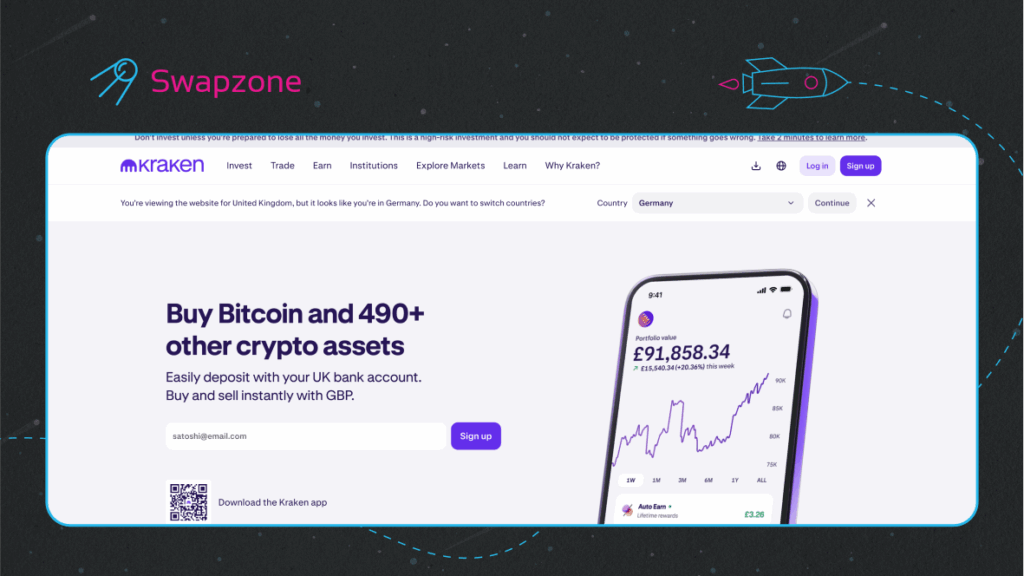
Kraken has earned its reputation as one of the most secure exchanges by focusing on security fundamentals. Since launching in 2011, Kraken has never had a major security breach, impressive in an industry full of hacks. Their 95% cold storage uses military-grade encryption and multi-signature technology.
What sets Kraken apart is their proof-of-reserves transparency. They publish monthly audits showing exact cryptocurrency holdings and customer liabilities so users can verify their funds independently. This transparency became crucial after FTX’s collapse as it proves Kraken has full reserves for all customer deposits.
Their Global Settings Lock (GSL) provides unique security for high-value accounts. GSL prevents all account changes, including withdrawals and settings modifications, until manually disabled through a time-delayed process. This feature stops attackers from modifying accounts even with full login credentials.
Advanced Security Features:
- PGP-encrypted email communications
- Yubikey hardware token support
- API key withdrawal restrictions
- Master key required for large withdrawals
- Automated security monitoring 24/7
3. Gemini – Institutional-Grade Security
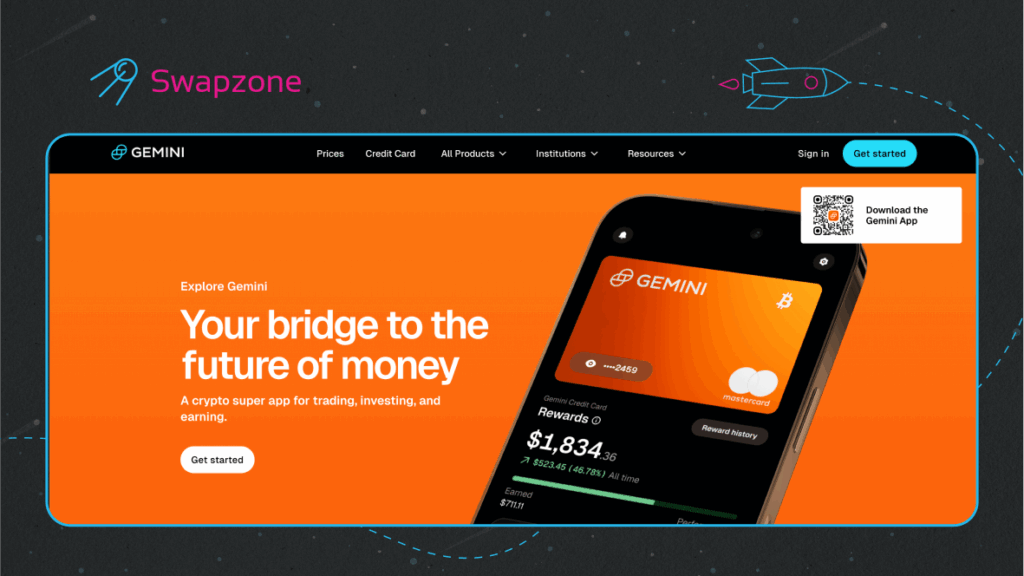
Gemni is regulated by New York’s strict BitLicense which means some of the strongest consumer protections in the industry. The Winklevoss-owned exchange keeps 95% of funds in cold storage using bank-grade security systems and multi-signature wallets across multiple geographic locations.
Their SOC 2 Type 2 certification goes beyond basic technical security. Gemini has continuous third-party security audits and comprehensive incident response procedures. Their customer support team receives extensive security training to prevent social engineering attacks.
Insurance through Aon covers hot and cold wallet storage. Unlike many exchanges that only insure their own funds, Gemini’s policy covers customer deposits during the custody process. Their FDIC insurance covers USD deposits through State Street Bank.
Unique Security Features:
- Multi-factor authentication required for all accounts
- Withdrawal address whitelisting with confirmation delays
- Advanced fraud detection using behavioral analysis
- Segregated customer fund storage with quarterly audits
- 24/7 security operations center monitoring
4. Binance US – Security Through Scale and Innovation
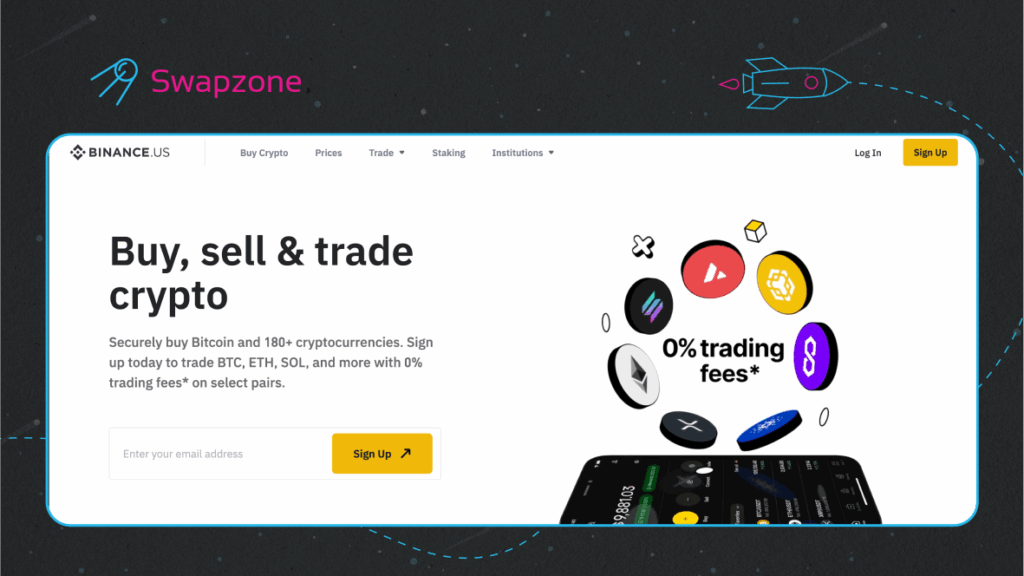
Binance US operates independently from the global Binance platform, focused on US regulatory compliance and customer protection. The exchange has 95% cold storage with a combination of hardware security modules and multi-signature wallets distributed across secure facilities.
After the FTX collapse, Binance US added proof-of-reserves reporting with monthly audits and real-time reserve ratios. Users can verify the exchange has full reserves for their specific holdings, unprecedented transparency in fund custody.
The platform’s SAFU fund (Secure Asset Fund for Users) allocates 10% of trading fees to an emergency insurance fund. This fund covers losses from security breaches or technical failures, extra protection beyond standard insurance.
Security Innovation:
- Anti-phishing code system for email verification
- Device management with auto logout features
- Advanced withdrawal risk assessment algorithms
- Real-time security alerts and suspicious activity detection
- Granular API security
Tier 2: High-Security Reliable Options
5. Token Metrics Exchange – AI-Enhanced Security
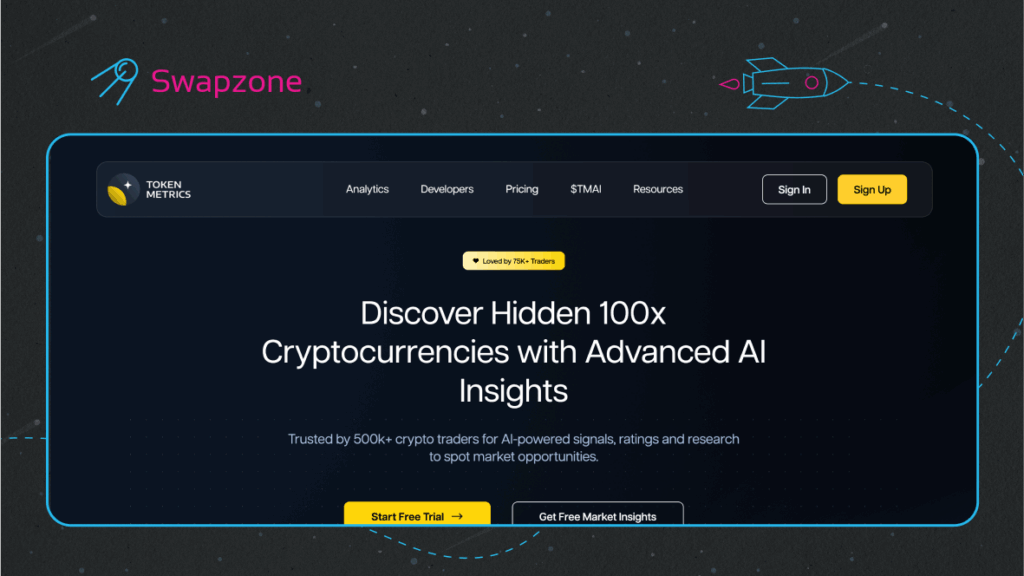
Token Metrics combines traditional exchange security with AI monitoring systems. The platform uses machine learning to detect unusual trading patterns and potential security threats in real-time. 90% cold storage with multi-signature and private keys distributed geographically.
What makes Token Metrics unique is their AI-powered risk assessment that evaluates every transaction for fraud indicators. This system learns from historical attack patterns and adapts to new threats automatically, dynamic security that evolves with the changing risk landscape.
AI Security Features:
- Behavioral analysis for account compromise detection
- Predictive fraud modeling for transactions
- Automated risk scoring for withdrawals
- Machine learning-based phishing detection
- Real-time threat intelligence
6. Robinhood Crypto – Simplified Security for Beginners
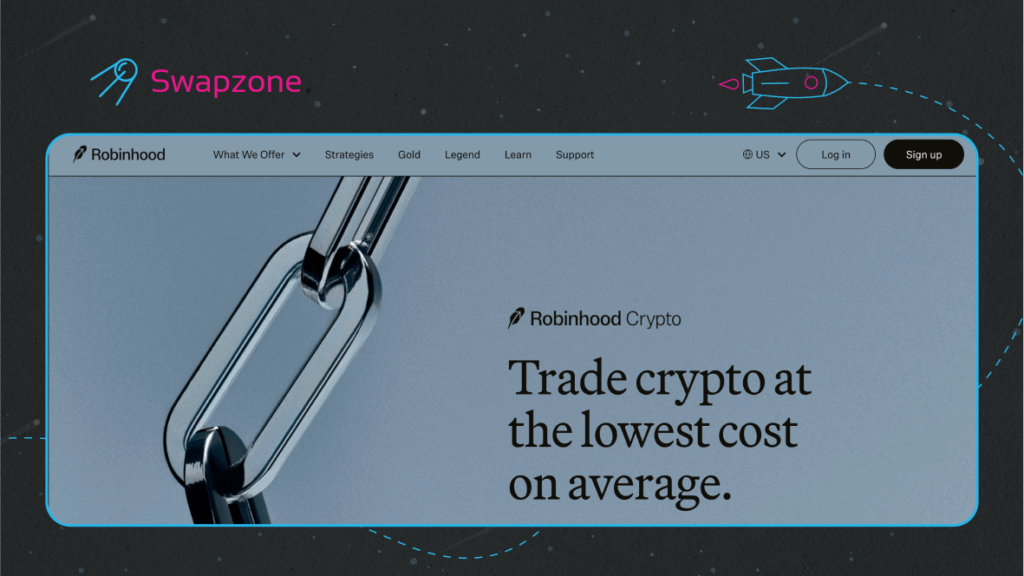
Robinhood takes a different approach to crypto security, simplicity without sacrificing protection. As a publicly traded company with traditional securities licensing, Robinhood is under SEC oversight, extra layers of accountability. 80% cold storage for crypto and SIPC insurance for securities.Many Reddit discussions about best crypto exchanges for security 2025 robinhood mention the platform’s strength in protecting new investors. Their simple interface reduces user errors that lead to security breaches, while maintaining institutional-grade backend security.Simplified Security:
- Auto security settings
- 2FA setup
- Fraud protection through banking partnerships
- No withdrawal fees
- Security education and alerts
7. Crypto.com – Full Security Ecosystem
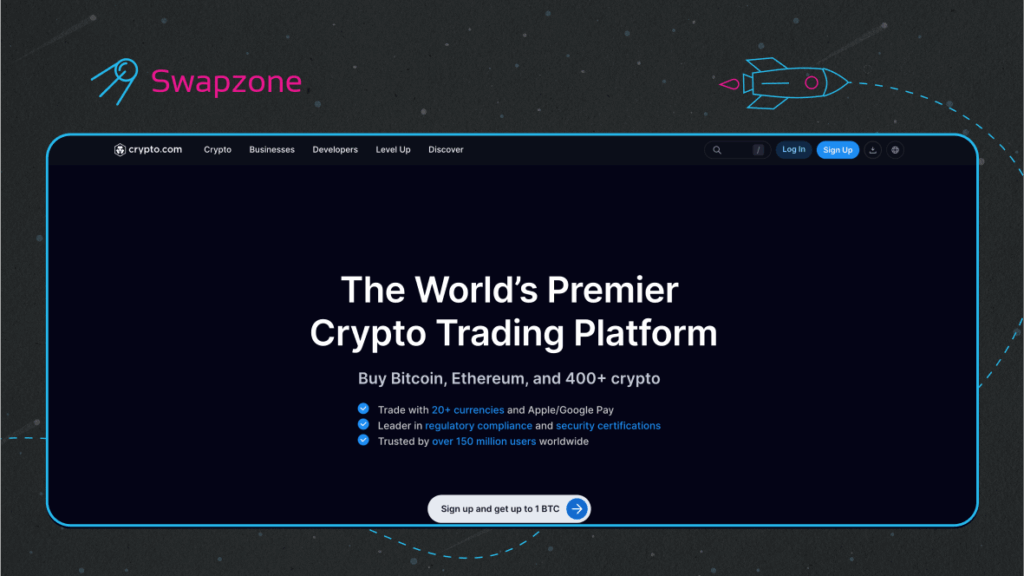
Crypto.com has invested heavily in security after rapid growth in the past few years. They have 95% cold storage using multi-signature wallets and have never lost customer funds due to security breaches. Their $750 million insurance covers both digital assets and fiat currency.
The platform’s multi-layered security includes hardware security modules, real-time monitoring and advanced encryption for all data storage and transmission. They also have anti-money laundering (AML) systems that exceed regulatory requirements in most countries.
8. FTX US (Pre-Collapse Analysis) – Lessons Learned

FTX US was separate from the international FTX platform, but its collapse is a lesson in exchange security. The platform looked secure on the surface with claimed cold storage percentages and insurance coverage. But the fundamental flaw was inadequate fund segregation and no regulatory oversight.
This is why regulatory compliance and transparent auditing matter more than technical security features. Exchanges can have fancy security systems and still fail on basic fund custody.
Tier 3: Budget Friendly Options
9. KuCoin – International Standards
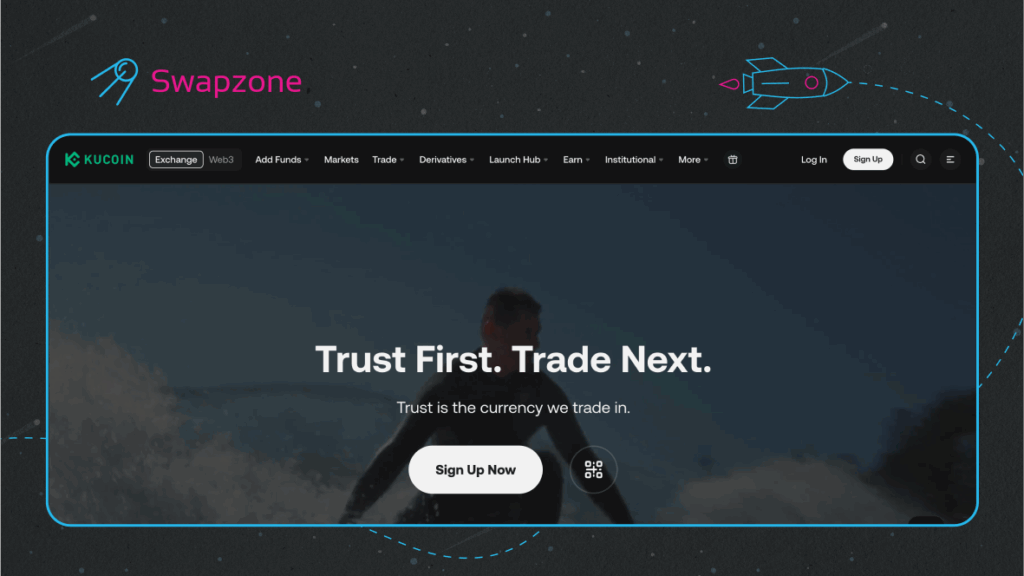
KuCoin has multiple international licenses and strong security standards despite low fees. They have 95% of funds in cold storage and recovered from a 2020 security incident by adding more monitoring systems and insurance.
11. Huobi – Global Presence (HTX)
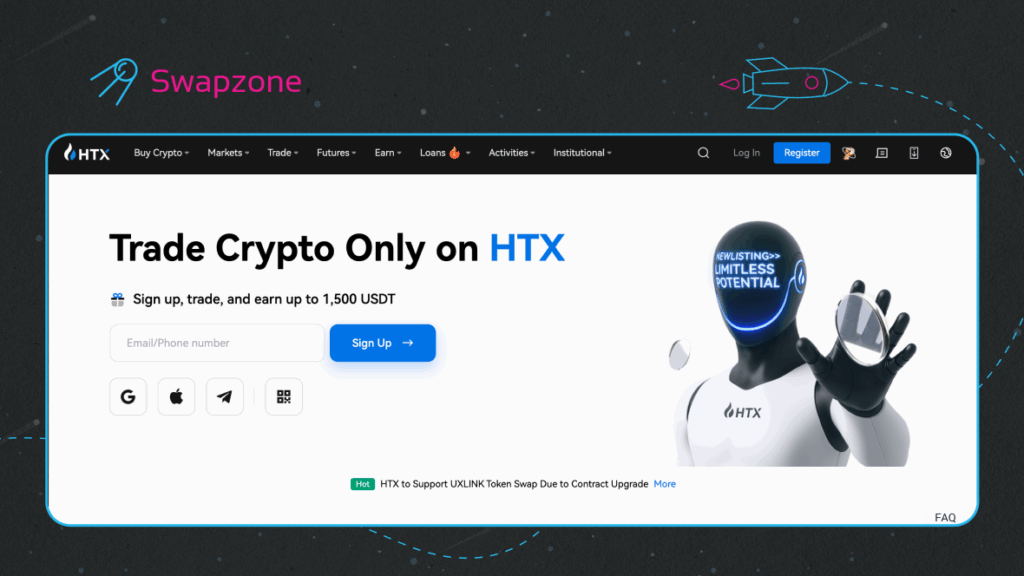
Huobi has operations in multiple countries with varying security standards. Their US operations have 85% cold storage and good security for budget traders.
12. Gate.io – Emerging Security Leader
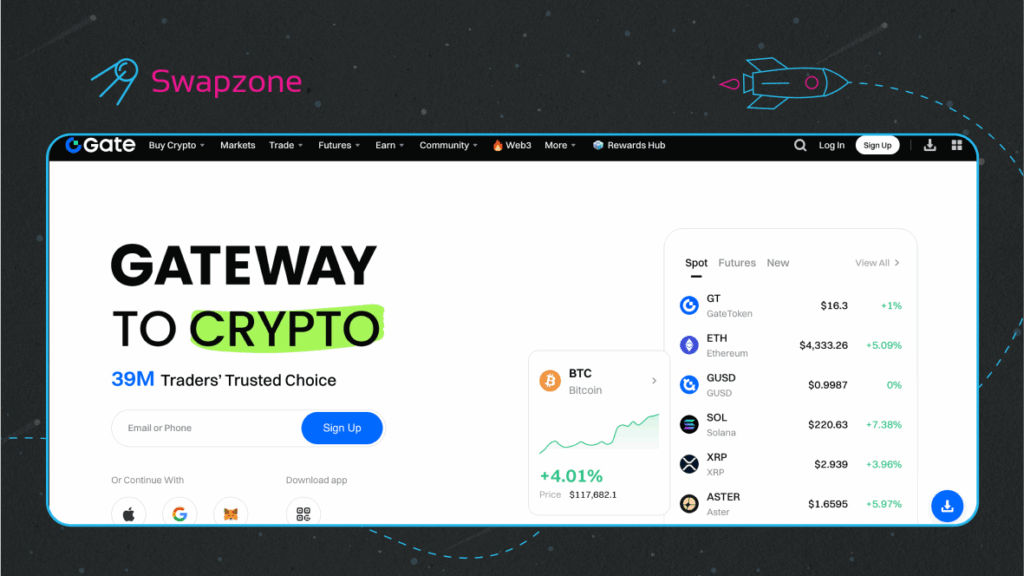
Gate.io has improved security a lot with 90% cold storage and proof-of-reserves reporting. Good security for international users looking for lower fees.
Must-Haves
Required Features
Every crypto exchange must offer hardware security key support as a standard feature, not an optional upgrade. YubiKey and other FIDO2-compatible devices are unphishable authentication that SMS codes and mobile apps can’t match. The most secure exchanges make hardware keys mandatory for accounts over $10,000.
Whitelist address functionality creates a barrier against unauthorized withdrawals. This feature requires pre-approval for all withdrawal destinations, with confirmation delays of 24-48 hours for new addresses. Even if attackers get your account credentials, they can’t withdraw to addresses outside the approved whitelist.
Time-delayed withdrawals provide additional security layers to give you time to detect and prevent unauthorized transactions. Top exchanges have progressive delay systems—small withdrawals process immediately, while larger amounts trigger delays of 1-48 hours based on withdrawal size and account history.Geographic restriction controls block account access from unexpected locations. You can restrict account access to specific countries or regions and accounts will lock when login attempts come from blacklisted areas. This was super helpful during the SIM swapping attacks on crypto holders.
Advanced Features
Biometric authentication methods are now standard among top 10 crypto exchanges. Fingerprint scanning, facial recognition, and voice authentication add extra security layers that can’t be replicated by hackers. But biometric data storage requires careful implementation to protect your privacy.
Multi-device verification systems ensure account access requires confirmation from multiple registered devices. This prevents single points of failure—if one device is compromised, hackers can’t access your account without confirming through secondary devices. The most advanced implementations use push notifications with cryptographic signatures to verify legitimate access attempts.
Smart contract auditing is key as exchanges integrate DeFi features and automated trading systems. Third-party security firms like CertiK and Trail of Bits do comprehensive smart contract reviews to identify potential vulnerabilities before deployment. Prioritize exchanges that do regular smart contract audits for all automated systems.
Real-time security monitoring uses AI and machine learning to detect unusual account behavior patterns. These systems analyze login locations, trading patterns, withdrawal frequencies and device characteristics to detect potential compromises before damage is done. Advanced analytics can detect account takeovers in minutes of unauthorized access.
Red Flags to Watch Out For
Warning Signs
No regulatory licenses is the biggest red flag when evaluating security. Unlicensed exchanges have no oversight, customer protection requirements or legal accountability. Always check if exchanges have proper licenses in their operating jurisdictions—money transmitter licenses for US, FCA approval for UK or BaFin licensing for German exchanges.
Unclear fund custody should disqualify any exchange from consideration. Legit platforms explain in detail their cold storage percentages, multi-signature implementations and insurance coverage. If an exchange can’t explain how they protect customer funds, assume they don’t have proper protection.
No insurance coverage disclosure means either inadequate protection or lack of transparency about existing coverage. Reputable exchanges display their insurance details prominently, including coverage amounts, insurance providers and specific protection scenarios. They also explain clearly what customer actions might void insurance protection.
Poor customer support response time often correlates with poor security incident response. If an exchange can’t respond to basic customer questions within reasonable timeframes, they likely don’t have resources to handle security emergencies. Test customer support before depositing big funds.
Due Diligence Checklist
Before you trust any exchange with your digital assets, go through this comprehensive verification process:Verification:
- Regulatory:
- Check for proper licensing in operating jurisdiction
- Verify regulatory compliance history
- Check for any enforcement actions or penalties
- Review legal entity structure and ownership
- Financial:
- Check insurance coverage details and limits
- Review proof-of-reserves reports if available
- Analyze financial statements (for publicly traded exchanges)
- Investigate any bankruptcy or financial distress history
- Technical:
- Test available security features
- Verify cold storage claims through public disclosures
- Review third-party security audit reports
- Check withdrawal and deposit procedures
- Community:
- Monitor Reddit discussions about exchange reliability
- Review professional security assessments
- Investigate any historical security incidents
- Analyze user complaints and resolution patterns
Beyond Exchange Selection
Personal Security
Hardware wallet integration is the ultimate security for long term storage. Even the most secure exchanges have risks that hardware wallets eliminate entirely. Ledger and Trezor devices store private keys in secure elements that are isolated from internet connectivity. Best practice is to keep only active trading funds on exchanges and store long term holdings on hardware wallets.
Portfolio diversification across exchanges reduces single points of failure while keeping trading flexibility. Instead of having all funds on one platform, spread across 2-3 top rated secure exchanges. This way you protect against exchange specific risks and have a backup if one platform has technical issues or security incidents.
Regular security audits helps you detect compromises before damage is done. Monthly security reviews should include password updates, device access reviews, API key audits and withdrawal address verification. Create checklists to ensure consistent security hygiene across all cryptocurrency accounts.
Emergency exit plan prepares you for worst case scenarios when you need to withdraw funds immediately. Document withdrawal procedures for each exchange, including verification steps and processing times. Have emergency contact information for customer support and backup authentication methods ready.
Staying Informed on Exchange Security
Monitoring tools and resources gives you real time awareness of security threats and exchange status updates. CoinDesk and The Block have great coverage of security incidents and regulatory changes. Twitter accounts of exchange security teams often post updates during active incidents.
Community warning systems uses collective intelligence to identify emerging threats and suspicious activities. Reddit communities like r/cryptocurrency and r/bitcoinmarkets often surface security concerns before mainstream media. But always verify community reports through official channels before taking action.
Regulatory change tracking helps you anticipate security requirement updates and compliance changes. FinCEN guidance, SEC statements and CFTC regulations often signal upcoming security standard changes. Exchanges that implement changes ahead of time usually have better long term security.
Security breach response protocols should be predetermined and practiced regularly. Know exactly how to secure your accounts, contact customer support and document potential losses immediately when security incidents happen. Quick response times often determines recovery rates.
Crypto Exchanges FAQs
Which exchange is the most secure in 2025?
Coinbase and Kraken are the most secure due to their regulatory compliance, insurance coverage and proven track record. Coinbase is a publicly traded company under SEC oversight and Kraken has transparent proof-of-reserves and has never had a major breach. Both have over 95% of funds in cold storage and full insurance coverage.
How do I check an exchange’s insurance coverage?
Legitimate exchanges have detailed insurance disclosures in their terms of service and security pages. Look for specific coverage amounts, insurance provider names (like Lloyd’s of London or Aon) and clear explanations of what scenarios trigger coverage. Contact support to request current insurance certificates if disclosures seem incomplete or outdated.
How much should I keep on exchanges?
Experts recommend keeping only 5-10% of your total crypto on exchanges, the rest in hardware wallets or other cold storage. Active traders might keep 20-30% on exchanges for immediate trading access but long term holdings should use hardware wallet storage to eliminate exchange risks entirely.
Are decentralized exchanges safer than centralized ones?
Decentralized exchanges (DEXs) eliminate custody risks since users control private keys but introduce smart contract risks and have less regulatory protection. DEXs like Uniswap and SushiSwap can’t steal your funds but face risks from smart contract bugs, impermanent loss and front-running attacks. The safest approach is to use both DEXs and regulated centralized exchanges based on your use case.
How often should I review my exchange settings?
Do monthly security checks that include password updates, 2FA verification, API key audits and withdrawal address reviews. Do annual comprehensive audits that reassess your entire exchange selection based on new security features and regulatory changes. Review settings immediately after any suspicious account activity or major industry security incidents.
Secure Exchange Choices 2025
2025 crypto landscape requires a whole new approach to exchange selection than previous years. Post-FTX security standards have raised the bar big time, with proof-of-reserves, regulatory compliance and insurance coverage non-negotiables rather than nice-to-haves.
Coinbase, Kraken and Gemini are clear leaders among safe crypto exchanges due to their regulatory compliance, transparent operations and proven track record. These platforms show that crypto trading security 2025 requires more than technical features – it demands comprehensive risk management, regulatory oversight and financial transparency.
The top 5 crypto exchanges have common characteristics: high cold storage percentages, comprehensive insurance coverage, regulatory compliance and transparent proof-of-reserves reporting. Whether you’re looking for the best exchange for beginners or advanced trading features, these security fundamentals apply to all user types.
Reddit always says free trading isn’t worth the risk if security suffers. The top 100 crypto exchanges globally show huge variation in security standards, so due diligence is a must. Even among the top 10 crypto exchanges in USA, security implementations vary greatly.
Your digital asset protection strategy should go beyond exchange selection to include hardware wallet integration, portfolio diversification and regular security audits. The most advanced analytics and AI features mean nothing if basic custody and compliance requirements aren’t met.
Remember crypto exchange safety features 2025 are evolving fast. Customer support, liquidity and trading tools matter, but security should be your #1 criteria. Whether you’re into staking, margin trading or spot trading, choose platforms that walk the talk on customer protection not just marketing claims.
The lessons from FTX’s collapse aren’t just cautionary tales – they’re blueprints for evaluating modern exchange security. Choose platforms that would pass the same scrutiny, maintain regulatory compliance and prioritize customer fund protection over short-term profits. Your crypto future depends on making these security-first decisions today.
This guide provides educational information about cryptocurrency exchange security. Always do your own research and consult with financial advisors before making investment decisions. Cryptocurrency trading involves high risk of loss.
